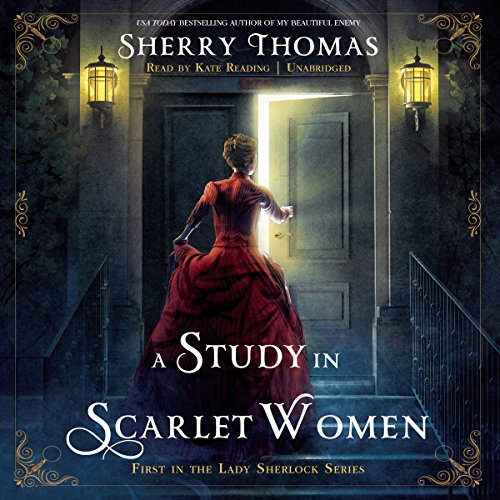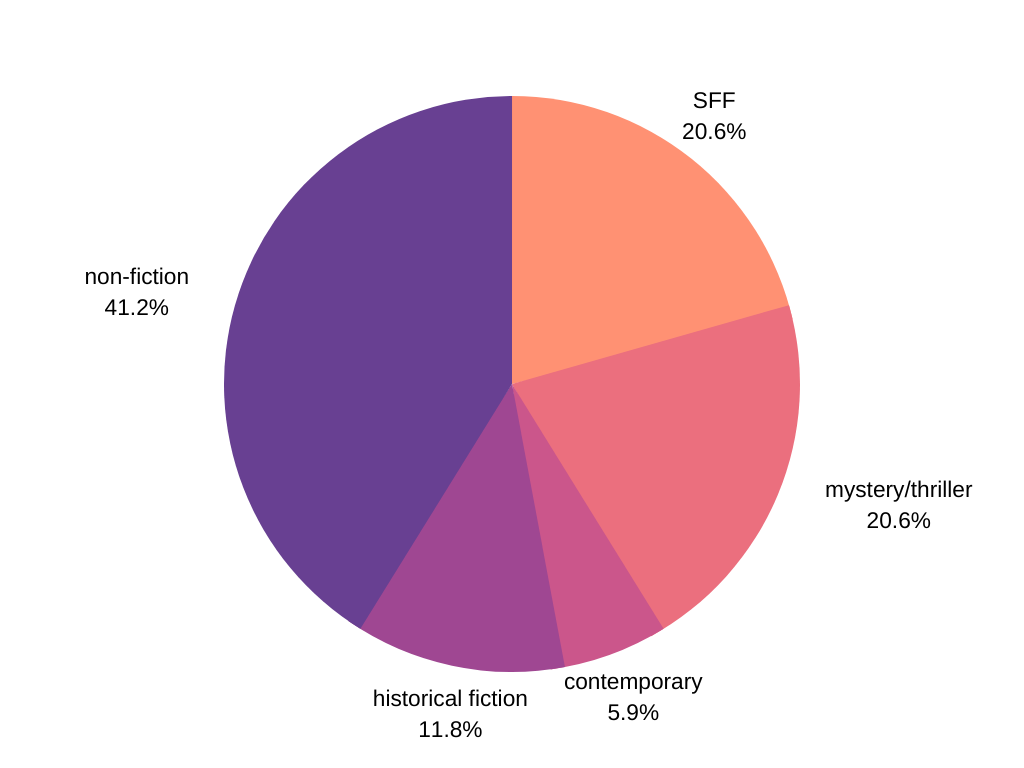My favorite books so far in 2021
With yet another quarter of self-isolation under my belt, it may come as no surprise that I read a lot of books. A grand total of 34, in fact, if you include unpublished manuscripts and two research books that I skimmed/didn’t read cover-to-cover.
As usual, I thought I’d pause and share a few of my favorites. If you’re looking for your next great read, scroll down for my 9 top picks.
(Please note that links below are affiliate links, which means if you click through and purchase something, I get a small commission at no extra cost to you.)
(Books marked with an * were written by a writer from a marginalized group. By supporting these authors, you’re telling publishers we want more books from underrepresented authors.)
Past Mistakes: How We Misinterpret History and Why it Matters

Why I loved it: I have some very strong feelings about how utterly trash my history education was. Slavery was whitewashed. Women were near-nonexistent. Queerness? Bah, that was invented two years ago!
This is some bullshit, and I’ve spent a lot of time in my thirties seeking out untold stories and hidden truths. And so I was delighted at every turn by the way this book broke down a series of misconceptions we have about history, why they matter, and how they’ve shaped the world we live in today. The book also happens to be compulsively readable (which is not always the case for history texts). Please go grab yourself a copy.
Description: The stories we tell about our past matter. But those stories have been shaped by prejudice, hoaxes and misinterpretations that have whitewashed entire chapters of history, erased women and invented civilisations. Today history is often used to justify xenophobia, nationalism and inequality as we cling to grand origin stories and heroic tales of extraordinary men.
Exploring myths, mysteries and misconceptions about the past – from the legacies of figures like Pythagoras and Christopher Columbus, to the realities of life in the gun-toting Wild West, to the archaeological digs that have upset our understanding of the birth of civilisation – David Mountain reveals how ongoing revolutions in history and archaeology are shedding light on the truth.
Full of adventures, and based on detailed research and interviews, Past Mistakes will make you reconsider your understanding of history – and of the world today.
The Downstairs Girl*
 Why I loved it: The voice in this book, my lord! I loved learning about a slice of history I knew nothing about and I loved the character, with her just-contained anger, her pushback against the injustices around her, and her humorous take on a dear abbey-style column.
Why I loved it: The voice in this book, my lord! I loved learning about a slice of history I knew nothing about and I loved the character, with her just-contained anger, her pushback against the injustices around her, and her humorous take on a dear abbey-style column.
Description: By day, 17-year-old Jo Kuan works as a lady’s maid for the cruel daughter of one of the wealthiest men in Atlanta. But by night, Jo moonlights as the pseudonymous author of a newspaper advice column for the genteel Southern lady, “Dear Miss Sweetie”. When her column becomes wildly popular, she uses the power of the pen to address some of society’s ills, but she’s not prepared for the backlash that follows when her column challenges fixed ideas about race and gender.
While her opponents clamor to uncover the secret identity of Miss Sweetie, a mysterious letter sets Jo off on a search for her own past and the parents who abandoned her as a baby. But when her efforts put her in the crosshairs of Atlanta’s most notorious criminal, Jo must decide whether she, a girl used to living in the shadows, is ready to step into the light.
Prepped*
 Why I loved it: As someone who grew up in a rather cult-like religious tradition and who vividly remembers the end-times prepping panic of Y2K, this book struck a chord. It pushes past the boundaries of the prepping I was introduced to as a child, but the main character’s frustrations and desperation at being trapped in something she doesn’t believe made my heart ache for her.
Why I loved it: As someone who grew up in a rather cult-like religious tradition and who vividly remembers the end-times prepping panic of Y2K, this book struck a chord. It pushes past the boundaries of the prepping I was introduced to as a child, but the main character’s frustrations and desperation at being trapped in something she doesn’t believe made my heart ache for her.
Description: Always be ready for the worst day of your life.
This is the mantra that Becca Aldaine has grown up with. Her family is part of a community of doomsday preppers, a neighborhood that prioritizes survivalist training over class trips or senior prom. They’re even arranging Becca’s marriage with Roy Kang, the only eligible boy in their community. Roy is a nice guy, but he’s so enthusiastic about prepping that Becca doesn’t have the heart to tell him she’s planning to leave as soon as she can earn a full ride to a college far, far away.
Then a devastating accident rocks Becca’s family and pushes the entire community, including Becca’s usually cynical little sister, deeper into the doomsday ideology. With her getaway plans thrown into jeopardy, the only person Becca can turn to is Roy, who reveals that he’s not nearly as clueless as he’s been pretending to be.
When Roy proposes they run away together, Becca will have to risk everything—including her heart—for a chance to hope for the best instead of planning for the worst.
A Study in Scarlet Women*
 Why I loved it: A surprising and charming take on the question: What if Sherlock Holmes was a woman? I loved the voice, the pacing, and every hilariously logical choice the main character made. I also think the character is meant to be neurodivergent and that was refreshing to me.
Why I loved it: A surprising and charming take on the question: What if Sherlock Holmes was a woman? I loved the voice, the pacing, and every hilariously logical choice the main character made. I also think the character is meant to be neurodivergent and that was refreshing to me.
Description: With her inquisitive mind, Charlotte Holmes has never felt comfortable with the demureness expected of the fairer sex in upper-class society. But even she never thought that she would become a social pariah, an outcast fending for herself on the mean streets of London.
When the city is struck by a trio of unexpected deaths and suspicion falls on her sister and her father, Charlotte is desperate to find the true culprits and clear the family name. She’ll have help from friends new and old, but in the end, it will be up to Charlotte, under the assumed name Sherlock Holmes, to challenge society’s expectations and match wits against an unseen mastermind.
Will My Cat Eat My Eyeballs?
 Why I loved it: She covers everything from corpse farts to what a mummified body might smell like. What’s not to love?
Why I loved it: She covers everything from corpse farts to what a mummified body might smell like. What’s not to love?
Description: Every day, funeral director Caitlin Doughty receives dozens of questions about death. The best questions come from kids. What would happen to an astronaut’s body if it were pushed out of a space shuttle? Do people poop when they die? Can Grandma have a Viking funeral?
In Will My Cat Eat My Eyeballs?, Doughty blends her mortician’s knowledge of the body and the intriguing history behind common misconceptions about corpses to offer factual, hilarious, and candid answers to 35 distinctive questions posed by her youngest fans. In her inimitable voice, Doughty details lore and science of what happens to, and inside, our bodies after we die. Why do corpses groan? What causes bodies to turn colors during decomposition? And why do hair and nails appear longer after death? Listeners will learn the best soil for mummifying your body, whether you can preserve your best friend’s skull as a keepsake, and what happens when you die on a plane.
The Death of Democracy
 Why I loved it: My knowledge of Weimar Germany (pre-Nazi Germany) was pretty woefully small before I read this book. It was a very interesting look at how progressive things actually were before the Nazis came into power and how complicated their journey into power was. This is another very readable history text (not too dense) and I recommend the audiobook in particular.
Why I loved it: My knowledge of Weimar Germany (pre-Nazi Germany) was pretty woefully small before I read this book. It was a very interesting look at how progressive things actually were before the Nazis came into power and how complicated their journey into power was. This is another very readable history text (not too dense) and I recommend the audiobook in particular.
Description: Why did democracy fall apart so quickly and completely in Germany in the 1930s? How did a democratic government allow Adolf Hitler to seize power? In this dramatic audiobook, Benjamin Carter Hett answers these questions, and the story he tells has disturbing resonances for our own time.
To say that Hitler was elected is too simple. From the late 1920s, the Weimar Republic’s very political success sparked insurgencies against it, of which the most dangerous was the populist anti-globalization movement led by Hitler. But as Hett shows, Hitler would never have come to power if Germany’s leading politicians had not tried to coopt him, a strategy that backed them into a corner from which the only way out was to bring the Nazis in. Hett lays bare the misguided confidence of conservative politicians who believed that Hitler and his followers would willingly support them, not recognizing that their efforts to use the Nazis actually played into Hitler’s hands. They had willingly given him the tools to turn Germany into a vicious dictatorship.
When No One Is Watching*
 Why I loved it: My favorite mystery/thrillers are the character-driven ones, and this book was absolutely that. It wasn’t about a crime as much as it was about the people and how the sinister thing that is happening behind the scenes impacts them. The audiobook is fantastic if you’re looking for a good listen.
Why I loved it: My favorite mystery/thrillers are the character-driven ones, and this book was absolutely that. It wasn’t about a crime as much as it was about the people and how the sinister thing that is happening behind the scenes impacts them. The audiobook is fantastic if you’re looking for a good listen.
Description: Sydney Green is Brooklyn born and raised, but her beloved neighborhood seems to change every time she blinks. Condos are sprouting like weeds, FOR SALE signs are popping up overnight, and the neighbors she’s known all her life are disappearing. To hold onto her community’s past and present, Sydney channels her frustration into a walking tour and finds an unlikely and unwanted assistant in one of the new arrivals to the block – her neighbor, Theo.
But Sydney and Theo’s deep dive into history quickly becomes a dizzying descent into paranoia and fear. Their neighbors may not have moved to the suburbs after all, and the push to revitalize the community may be more deadly than advertised.
When does coincidence become conspiracy? Where do people go when gentrification pushes them out? Can Sydney and Theo trust each other – or themselves – long enough to find out before they too disappear?
Know My Name*
 Why I loved it: It’s as heartbreaking and enraging as you’d expect, but also beautifully, lyrically written. I loved how she wove in other, related tragedies to make her points about women’s safety.
Why I loved it: It’s as heartbreaking and enraging as you’d expect, but also beautifully, lyrically written. I loved how she wove in other, related tragedies to make her points about women’s safety.
Description: She was known to the world as Emily Doe when she stunned millions with a letter. Brock Turner had been sentenced to just six months in county jail after he was found sexually assaulting her on Stanford’s campus. Her victim impact statement was posted on BuzzFeed, where it instantly went viral – viewed by 11 million people within four days, it was translated globally and read on the floor of Congress; it inspired changes in California law and the recall of the judge in the case. Thousands wrote to say that she had given them the courage to share their own experiences of assault for the first time.
Now, she reclaims her identity to tell her story of trauma, transcendence, and the power of words. It was the perfect case, in many ways – there were eyewitnesses, Turner ran away, physical evidence was immediately secured. But her struggles with isolation and shame during the aftermath and the trial reveal the oppression victims face in even the best-case scenarios. Her story illuminates a culture biased to protect perpetrators, indicts a criminal justice system designed to fail the most vulnerable, and, ultimately, shines with the courage required to move through suffering and live a full and beautiful life.
Why Does He Do That?
 Why I loved it: WHEW. This book should be required reading for every person. It breaks down not only a variety of forms of abusive, neglectful, or toxic behavior, but what it takes for man with these behaviors to actually change (hint: therapy might backfire and abuser programs are a better bet).
Why I loved it: WHEW. This book should be required reading for every person. It breaks down not only a variety of forms of abusive, neglectful, or toxic behavior, but what it takes for man with these behaviors to actually change (hint: therapy might backfire and abuser programs are a better bet).
Description: He says he loves you. So…why does he do that? You’ve asked yourself this question again and again. Now you have the chance to see inside the minds of angry and controlling men—and to change your life. In this groundbreaking book, a counselor who specializes in working with abusive men shows you how to improve, survive, or leave an abusive relationship. You will learn about:
- The early warning signs
- Ten abusive personality types
- The role of drugs and alcohol
- What you can fix, and what you can’t
- How to get out of a relationship safely
*
Reading stats
Last year, I started tracking my reading to get a better sense of what types of books I read, what genres I gravitate to, etc. In case that’s interesting to you, here is this month’s breakdown.
For reference, the chart includes the 34 finished books. I also DNFed (Did Not Finish) 17+ books, of which I read anywhere from a couple chapters to half of the book before putting it down (for a wide variety of reasons). I have not included them in my tally.

Graphic description: 41% non-fiction, 21% SFF, 21% mystery/thriller, 12% historical fiction, 6% contemporary. (Figures are rounded.)
*
What have been your favorite reads so far this year?
Comments
-
Deb
My taste in books seems to be much like yours, though my non-fiction usually isn’t of interest in a global manner, but more localized to a family or town. I also have found myself reading more during the pandemic, not only because I retired shortly before it started and have more time on my hands, but to arm myself about the widespread propaganda about the pandemic and politics.

Kristen
Lundy Bancroft’s book is phenomenal. The Gift of Fear by Gavin de Becker is another similar read, but with a whole additional set of skills learned by the end. Kind of like graduating from spy academy (a little slow to start, but then…amazing). I’ve recommended both for years so it’s nice to see someone else listing this!